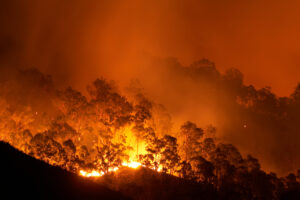Arson vs. Reckless Burning
There are two separate crimes for starting fires in California: arson and reckless burning. The differences between the two are substantial, and punishments can range from six months in jail to almost a decade in prison.
Knowing what is a crime versus what is acceptable conduct is important for anyone, but it is crucial that campers, hikers, and anybody who enjoys the outdoors understand California fire-starting laws. The state takes the prevention of wildfires very seriously, and the punishments for arson and reckless burning reflect that.
Arson Requires Willful and Malicious Actions
To be convicted for criminal arson in California, a prosecutor must prove that you burned a building, property, or forest through willful and malicious actions. Setting a fire that causes damage or destruction to a part of any structure or land is criminalized by the arson statute, no matter how small the amount of property actually burned is.
Committing a crime willfully and maliciously means that your actions were taken purposely and with intent to do something wrong. Malicious activities can include intending to harm someone, whether physically or financially, or to defraud. For example, burning your business to collect insurance money would be a malicious action because you attempted to defraud the insurance company.
Reckless Burning Is More Than Negligent Acts
Like arson, the crime of reckless burning criminalizes setting fire to any structure, property, or forest land. Unlike arson, to be convicted of reckless burning, a prosecutor only has to prove that you set the fire recklessly instead of willfully and maliciously.
For a fire to be considered recklessly-started, you must have:
- Been aware your actions could cause a significant risk of fire
- Ignored the risk when a reasonable person would have acted differently.
Recklessness is different from negligence; even negligent accidents that cause a fire. For example, a camper who fails to put out their cookfire before leaving an area is acting recklessly. But genuine accidents such as leaving your backyard grill on after making hamburgers are generally not criminal, even if it causes the grill to catch fire.
This distinction turns on how different your actions were from reasonable behavior. Everyone forgets to turn something off once in a while, but campers have an additional duty to avoid causing forest fires. Likewise, tossing a lit cigarette on a city sidewalk carries different risks than throwing it into a bush in a park.
Punishments for Arson Are Stronger Than for Reckless Burning
Arson is always a felony in California, with the punishment’s severity varying based on whether anyone was injured and the type of burning. Prison sentences can range from 16 months (for arson of personal property like clothing or trash) to 9 years (for an arson offense that caused great bodily harm). Burning an inhabited building is generally punished more harshly than burning open land unless the fire became out of control.
As opposed to arson, reckless burning is typically a misdemeanor in California. Being convicted of reckless burning can be punished by up to six months in county jail and a $1,000 fine. However, if your reckless actions cause great bodily harm or lead to the burning of a building or forest, you may face felony charges. Depending on how severe the damage or injuries, the maximum punishment for felony reckless burning is six years in state prison.
Because the difference between being convicted of arson or reckless burning can mean years in prison, you will need a skilled criminal defense attorney to help you obtain the best result possible. The Chambers Law Firm is here to help if you face fire-related charges in Mission Viejo, California. Reach out to us at 714-760-4088 or dchambers@clfca.com as soon as possible.





